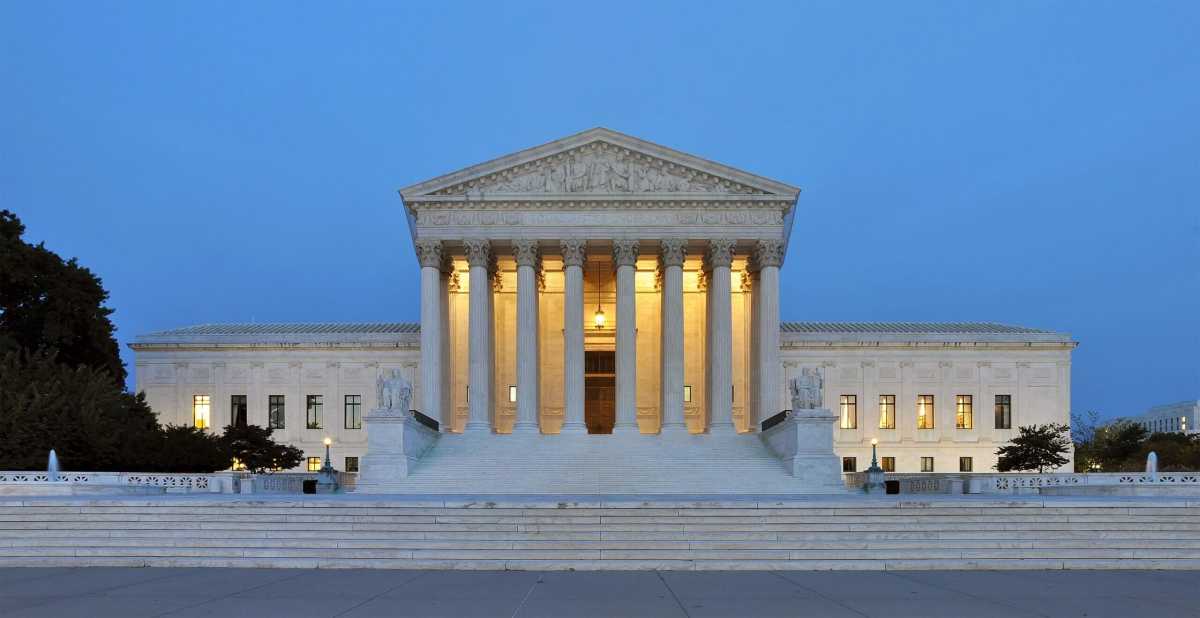The US Supreme Court started its October 2023 term, which extends into the early summer of 2024, with no active cases on its docket directly addressing LGBTQ legal controversies, but petitions have been filed asking the court to take up at least three vigorously litigated issues that drew contradictory opinions from lower federal courts. The court’s criteria for deciding which cases to review emphasize disagreements among the lower courts on issues that require a nationwide precedent.
Does it violate the free speech rights of licensed health care professionals for states or localities to pass laws forbidding the performance of “conversion therapy” on minors? “Conversion therapy” (sometimes called Sexual Orientation Change Efforts, or SOCE) is an attempt by counselors to alter a person’s sexual orientation or, sometimes, gender identity, through psychological means. Most reputable professional associations that have considered the matter have opined that this practice is both unable to alter a person’s sexual orientation or gender identity and risks causing significant psychological harm to the individual. Persuaded by these professional opinions, many states and some localities have passed laws banning the practice.
The court has been considering whether to take up this issue since the beginning of its the term this fall. A petition raising the question was filed last spring in the case of Tingley v. Ferguson, in which the San Francisco-based Ninth Circuit Court of Appeals upheld Washington state’s ban on conversion therapy for minors against a challenge brought by a licensed marriage and family counselor, Brian Tingley. The court of appeals majority concluded that this was a regulation of professional practice, only incidentally affecting speech, and justified by the legislature’s fact-finding on the issue. Equal Rights Washington, an LGBTQ civil rights group, intervened in the lawsuit to support Washington Attorney General Robert Ferguson in defending the statute, and is named as “Respondent-Intervenor” in the petition filed with the court.
Several federal courts of appeals rejected First Amendment free speech challenges to such laws shortly after they began to be enacted, most notably in challenges to the New Jersey and California statutes. But more recently, the Atlanta-based 11th Circuit Court of Appeals found that a Boca Raton, Florida, ordinance banning such “therapy” violated the free speech rights of counselors who had challenged the law. The counselors argued that because the therapy they provided was completely “talk therapy,” their freedom of speech was unconstitutionally burdened when a city deemed it unlawful, and a divided panel of the 11th Circuit rejected the reasoning of the courts in earlier cases, producing what is called a “circuit split.”
Although the petition was filed in March, responding documents completing the file for the Supreme Court’s consideration were not completed until the court had recessed for the summer. The court holds private conferences of the justices to decide which petitions to grant, and this case has been on their agenda repeatedly since the beginning of the current Term that began on Oct. 2.
Alliance Defending Freedom, which has a strong track record of getting its cases to the Supreme Court, represents Tingley.
The second LGBTQ-related petition was filed during October in Metropolitan School District of Martinsville v. A.C., in which the Chicago-based Seventh Circuit Court of Appeals, standing by an its earlier decision in Whitaker v. Kenosha Unified School District, one of the first rulings on the subject, held that the school district violated Title IX of the Education Amendments of 1972 and the Fourteenth Amendment Equal Protection Clause by forbidding a transgender boy from using the boys’ restroom facilities at the district’s middle school. The district court in Indiana and the Seventh Circuit agreed that Title IX, which bans discrimination because of sex by schools that get federal money, and the Equal Protection Clause, which has been interpreted by the Supreme Court to ban in most cases government discrimination because of a person’s sex, require the school to allow a student to use single-sex facilities that are consistent with the student’s gender identity. The Seventh Circuit courts found that the Supreme Court’s 2020 decision in Bostock v. Clayton County, Georgia, provides a strong persuasive precedent for this conclusion. In Bostock, the court held that a person who was fired from her job because she was transitioning could bring a sex discrimination claim under Title VII.
The Seventh Circuit refused to follow a recent ruling by the Atlanta-based 11th Circuit, which had ruled against a transgender boy seeking restroom access against a Florida school district. The 11th Circuit ruling created the “circuit split” on this issue.
The petition for the Martinsville, Indiana, school district was filed by former US Solicitor General Paul Clement, who specializes in representing litigants before the Supreme Court. Clement persuasively argues in his petition that the division of views among the federal courts about the transgender “bathroom” cases calls for a nationwide interpretation of Title IX and the Equal Protection Clause, focused particularly on whether “transgender status” or “gender identity” should be deemed on a par with “discrimination because of sex.”
Clement notes that the court’s Bostock decision dealt specifically with employee discharges, and the court’s opinion by Justice Neil Gorsuch disclaimed any ruling about other issues, such as bathroom access. Clement argues that the “privacy” issues raised by bathroom access support a conclusion that schools may segregate single-sex bathrooms based on “biological sex,” and that they are not required to go further to accommodate transgender students than to provide a gender-neutral facility for their use. In unrelated litigation, several federal courts, have rejected lawsuits by parents and students who oppose allowing transgender boys and girls to use single-sex restrooms consistent with their gender identity.
This case potentially affects more issues than just bathrooms. In his petition, Clement suggests that other hotly contested issues, including sports participation and names and pronouns of students, may turn on how the court decides the bathroom issue, issuing an invitation to the court to short-circuit many cases now pending in the lower courts on various transgender issues by ruling that neither Title IX nor the Equal Protection Clause forbid discrimination because of gender identity.
Most recently, the American Civil Liberties Union and Lambda Legal filed a petition on Nov. 1 asking the court to review a ruling by the Cincinnati-based Sixth Circuit Court of Appeals in L.S. v. Skrmetti, a case challenging the constitutionality of Tennessee’s law banning gender-affirming care for minors.
More than 20 states have passed such laws, many during the past two years as Republican state legislators have made the issue a top priority. Lawsuits were filed in many states challenging these laws, and at first it appeared that federal courts would issue preliminary injunctions stopping the laws from going into effect while the litigation proceeds. In order to issue such an injunction, the court has to find that the challengers to the law are likely to prevail in convincing the court that the law is unconstitutional. Many district courts and some courts of appeals have approved such preliminary injunctions, but the Sixth Circuit broke ranks earlier this year in cases from Tennessee and Kentucky, overturning the preliminary injunctions issued by the trial judges, and joining the Atlanta-based 11th Circuit in finding that states could enact such bans.
The Sixth Circuit panel rejected the argument that banning gender-affirming care for minors violates the Equal Protection rights of the minors or the Due Process parenting rights of their parents to determine what health care they will receive. The Sixth Circuit ruling has already had consequences beyond the states within the circuit, as a federal judge in Oklahoma (which is in the 10th Circuit) relied on the Sixth Circuit’s reasoning to reject a preliminary injunction against the Oklahoma ban. Furthermore, the St. Louis-based Eighth Circuit Court of Appeals has scheduled “en banc” review of a panel decision that upheld a preliminary injunction against Arkansas’s ban on gender-affirming care.
In the Tennessee case, the plaintiffs, three transgender minors, are petitioning the court to review the Sixth Circuit ruling, pointing out that if the law goes into effect their continuing care will be interrupted. They are expected to ask the court to stay the Sixth Circuit’s ruling and allow the preliminary injunctions issued by the district courts to remain in effect while the court decides what to do with this case.
The plaintiffs in the Kentucky case, Doe 1 v Thornbury, announced that they will also be petitioning the court to take up the Sixth Circuit’s decision for review. The Tennessee and Kentucky cases were consolidated for the argument before the Sixth Circuit, and would most likely be consolidated for consideration by the Supreme Court if it grants these petitions
It is possible that one or more of these cases will be argued and deciding during the current term of the court, which extends to the end of June, but even if the court decides to grant review, it is possible due to timing issues that the cases will not be argued and decided until the October 2024 Term of the court. When a petition is filed, the respondents have up to thirty days to file a response, and the case file is not distributed to the justices for their consideration until all filings are complete. Furthermore, respondents frequently request an extension of time to file their responses, and such extensions are routinely granted by the court. This explains why the court did not begin to consider the Tingley petition until the end of September when it began to consider petitions that had accumulated during the court’s summer recess.
If the court grants one or more of the petitions, that starts a new clock running on deadlines for briefs, responses and replies, as well as filing of “amicus curiae” (“friend of the court”) briefs by organizations and individuals interested in the cases. In recent years, cases on LGBTQ issues have normally attracted scores of such amicus briefs from state governments, organizations, and individuals. Groups of state attorneys general are likely to collaborate on amicus briefs in cases where state laws are being challenged or defended. LGBTQ rights organizations usually file amicus briefs when they are not involved in directly representing the parties in LGBTQ-related cases.



































